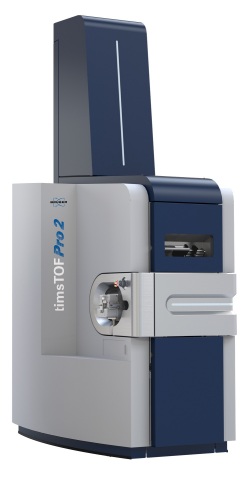BILLERICA, Mass.– At Bruker’s virtual 4D-Proteomics™ eXceed Symposium, Bruker Corporation (Nasdaq: BRKR) today announced the launch of two new timsTOF instruments. They further advance and enable new applications and methods in unbiased proteomics, epiproteomics/PTM characterization, and unbiased, deep multiomic biomarker discovery, for example in cancer liquid biopsy research. Bruker’s collaborators are making major progress in unbiased single cell proteomics, phosphoproteomics and plasma proteomics, leveraging the speed, sensitivity and dynamic range of large-scale CCS-enabled 4D-Proteomics and 4D-Epiproteomics.
At the end of 2020, a breakthrough paper by the Mann-group demonstrated unbiased, true single-cell proteomics on over 1,400 protein groups on a timsTOF R&D prototype to address new quantitative questions in single-cell biology and pathobiology.1 Bruker has accelerated its product development and today launches the ultra-high sensitivity timsTOF trueSCP system for unbiased, quantitative single-cell 4D-Proteomics, and for ultra-sensitive neoantigen discovery in immunopeptidomics.
Since its introduction in 2017, the timsTOF Pro system has offered researchers new capabilities in unbiased CCS-enabled 4D-Proteomics, typically on 5x-20x lower sample amounts and with 3x-5x faster run times for single shot, deep proteomics – with higher throughput and unprecedented robustness.
With the introduction of the next-generation timsTOF Pro 2, Bruker continues the revolution in CCS-enabled 4D-Proteomics, as well as in 4D-Epiproteomics, defined here broadly as the characterization of all protein posttranslational modifications (PTMs). The timsTOF Pro 2 offers deeper proteome coverage of >6,000 protein groups and >60,000 unique peptides in 60 minute gradients on 200 ng HeLa digests. It also achieves good depth of proteome and epiproteome coverage at 10x lower amounts, e.g., with ~4,000 proteins and ~30,000 peptides on 20 ng digests. The outstanding timsTOF Pro 2 sensitivity significantly enhances methods to detect post-translational modificiations (PTMs), such as phosphoproteomics and ubiquitination studies, for CCS-enabled, unbiased, large-scale 4D-Epiproteomics, which is tremendously important in physiology, cell biology and disease biology, especially in cancer.
Bruker also announced new capabilities in PaSER real-time search software for 4D-Proteomics. The new PaSER 2022 offers large-scale CCS-enabled bioinformatics, leveraging the unique tims/PASEF methods. For example, the new TIMScore™ increases the confidence of peptide IDs by leveraging the fourth dimension of large-scale collision cross sections (CCS) on all measured peptides. Increased confidence using CCS reduces ambiguities of redundant peptide sequences – resulting in more protein group and unique peptide identifications based on the same FDR threshold.
Frank H. Laukien, Bruker President and CEO, commented: “I believe that the timsTOF trueSCP is a revolutionary new tool for unbiased, deep and quantitative single-cell biology that is complementary to scRNA-seq. In the future, basic research in single-cell biology and pathogenesis will greatly benefit from ‘having both eyes open’ in gene expression, by combining transcriptomics with unbiased, deep and quantitative proteomics and epiproteomics data for multiomic biomarker panels.”
Dr. Laukien continued: “In liquid biopsies there is an unmet clinical need for greater cancer stage I/II detection sensitivity and improved positive predictive values, as well as for earlier detection of therapy resistance. For integrated multiomic deep learning in both, cancer cell genomics and epiproteomics, as well as in host immune response and tumor microenvironment, unbiased proteomics and PTMs are highly complementary to NGS for achieving further major progress in PPV for the benefit of patients.”


